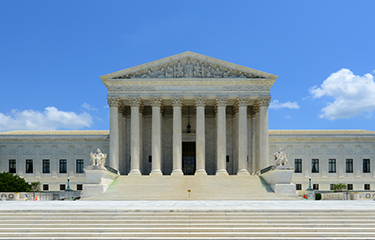A nonprofit civil rights group representing Atlantic herring fishermen wants to take its case to the U.S. Supreme Court as part of a growing movement to limit NOAA Fisheries’ rulemaking authority.
In 2020, NOAA Fisheries implemented a new rule requiring fishermen to pay for human at-sea monitors aboard their vessels. While the agency claimed the monitors are necessary to ensure compliance, fishermen balked at the cost, which they claim can be more than USD 700 (EUR 640) per day. Represented by the New Civil Liberties Alliance (NCLA), some of the fishermen sued the government to overturn the regulation.
The fishermen lost their case in 2021, and an appeal to the U.S. First Circuit Court was also unsuccessful. In finding in the government’s favor, the court leaned on the Chevron deference – a court precedent where the judicial branch gives agencies wide latitude in developing regulations without overt congressional input.
Now, the NCLA wants the Supreme Court to take up Relentless Inc. v. Dept. of Commerce and overturn the Chevron deference.
“This case concerns the core conflict between what Congress has permitted NOAA and the National Marine Fisheries Service to do and what those agencies wish to do,” NCLAS Litigation Counsel Kara Rollins said in a statement. “For decades, Chevron deference has emboldened agencies to twist statutory text to generate all manner of regulations Congress never authorized.”
While it’s not clear if the Supreme Court has any interest in taking up the case, it is listening to concerns about the Chevron deference. Last month, the court announced it would be hearing a similar but separate case also involving the U.S. Atlantic herring fishery, Loper Bright Enterprises v. Raimondo, that is also challenging NOAA’s at-sea monitor requirements and the Chevron deference more broadly.
“We are grateful to the Supreme Court for taking our case. Our way of life is in the hands of these justices, and we hope they will keep our families and our community in mind as they weigh their decision,” Bill Bright, one of the plaintiffs in the case, said at the time.
NCLA argues that Relentless Inc. v. Dept. of Commerce presents additional Chevron defects for the courts to consider in addition to those raised by Loper Bright.
“If the court grants cert in Relentless, it will have the full benefit of briefing on these defects of Chevron deference,” NCLA President and General Counsel Mark Chenoweth said in a statement. “But even if the court does not grant cert in Relentless, NCLA still anticipates the Court will decide the Chevron question in Loper Bright’s favor. It will then grant, vacate, and remand our clients’ case to the First Circuit.”
The NCLA has suggested another case it’s involved in, Mexican Gulf Fishing Company v. U.S. Department of Commerce, could play a role in the Supreme Court’s deliberations. In that class-action lawsuit, the NCLA represented 1,300 charter boat owners hoping to overturn a NOAA Fisheries regulation requiring GPS-monitoring of fishing vessels and electronic reporting of every trip. As in the other cases, NOAA Fisheries required fishermen to pay for the monitoring systems out of pocket.
In February 2023, the U.S. Court of Appeals for the Fifth Circuit ruled against NOAA Fisheries’ use of ambiguous language in the Magnuson-Stevens Act to authorize those regulations.
Earlier this month, the Supreme Court extended the deadline for briefs to be filed in Loper Bright to 10 July, with responses due 30 August.
Photo courtesy of Shutterstock / Wangkun Jia







